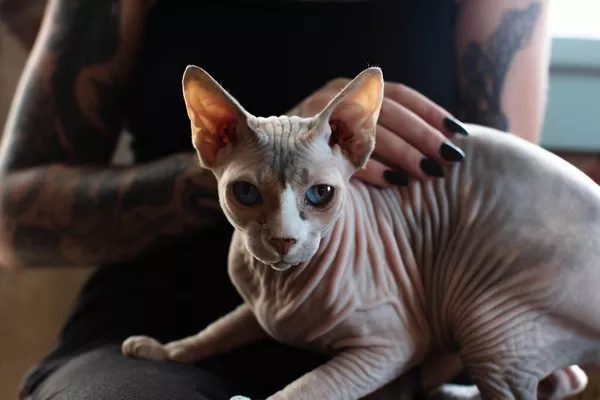Sphynx cats, with their distinctive hairless appearance and unique personalities, have captivated the hearts of cat lovers around the world. However, potential pet owners may hesitate to bring a Sphynx into their homes due to misconceptions about their care needs. In this article, we delve into the reality of caring for Sphynx cats, exploring their grooming requirements, health considerations, and overall well-being to determine whether they are truly challenging pets to care for.
Understanding the Sphynx Breed: An Overview
The Appearance of Sphynx Cats
Sphynx cats are known for their striking appearance, characterized by their lack of fur, wrinkled skin, and large ears. Despite their hairless exterior, Sphynx cats are not completely bald and may have a fine layer of downy fur that gives them a soft, velvety texture. Their distinctive appearance sets them apart from other cat breeds and makes them instantly recognizable to cat enthusiasts.
Personality Traits of Sphynx Cats
Beyond their unique appearance, Sphynx cats are beloved for their playful, affectionate, and outgoing personalities. They are known for their love of attention and social interaction, often seeking out human companionship and forming strong bonds with their owners. Sphynx cats are also known for their intelligence and curiosity, making them engaging and entertaining pets to have in the home.
Grooming Needs: Dispelling the Myth of Constant Maintenance
Minimal Grooming Requirements
Contrary to popular belief, Sphynx cats do not require extensive grooming due to their lack of fur. While it is true that they may need occasional baths to remove excess oil and dirt from their skin, Sphynx cats do not shed like other breeds and do not require regular brushing or grooming sessions. Their lack of fur also means that they are less likely to trigger allergies in sensitive individuals, making them suitable pets for allergy sufferers.
Skin Care Considerations
Despite their hairless appearance, Sphynx cats require regular skin care to maintain their health and well-being. Owners should be vigilant about keeping their Sphynx’s skin clean and moisturized, as they may be prone to dryness and irritation. Regular bathing with a gentle, hypoallergenic shampoo and application of moisturizing lotions or oils can help keep their skin in optimal condition.
Protecting Against Sunburn
One important consideration for Sphynx cat owners is protecting their pets from sunburn. Due to their lack of fur, Sphynx cats are more susceptible to sun damage and may require additional protection when exposed to sunlight. Owners should provide access to shaded areas and apply pet-safe sunscreen to their Sphynx’s exposed skin when spending time outdoors to prevent sunburn and potential skin damage.
Health Considerations: Addressing Potential Concerns
Respiratory Issues
Sphynx cats may be prone to respiratory issues, including upper respiratory infections and breathing difficulties. Due to their lack of fur, Sphynx cats may have more exposure to environmental allergens and airborne irritants, which can exacerbate respiratory symptoms. Owners should monitor their Sphynx’s breathing and seek veterinary care if they exhibit signs of respiratory distress.
Temperature Regulation
Another health consideration for Sphynx cats is their ability to regulate body temperature. Without the insulating properties of fur, Sphynx cats may be more sensitive to temperature extremes and may require additional warmth during colder months. Providing cozy bedding, warm clothing, and access to heated areas can help Sphynx cats stay comfortable and maintain their body heat in cooler climates.
Dental Care
Like all cats, Sphynx cats require regular dental care to maintain their oral health. Owners should establish a dental hygiene routine that includes brushing their Sphynx’s teeth regularly and providing dental treats or toys to promote oral hygiene. Routine dental check-ups with a veterinarian can also help identify and address any potential dental issues early on.
Overall Well-Being: Meeting the Needs of Sphynx Cats
Socialization and Interaction
Sphynx cats thrive on social interaction and companionship and may become lonely or anxious if left alone for extended periods. Owners should devote time to engaging with their Sphynx through play, cuddling, and interactive toys to ensure their emotional well-being. Providing a stimulating environment with opportunities for exploration and mental stimulation can also help keep Sphynx cats happy and fulfilled.
Diet and Nutrition
Proper nutrition is essential for the health and well-being of Sphynx cats. Owners should provide a balanced diet formulated specifically for cats, with high-quality protein sources and essential nutrients. Sphynx cats may have higher energy needs due to their active nature, so feeding them a diet tailored to their age, weight, and activity level is crucial for maintaining optimal health.
Veterinary Care
Regular veterinary check-ups are essential for monitoring the health of Sphynx cats and addressing any potential issues early on. Owners should schedule routine wellness exams, vaccinations, and parasite prevention treatments to ensure their Sphynx remains healthy and happy. Additionally, owners should be vigilant about monitoring their Sphynx’s skin, eyes, and overall condition for any signs of illness or discomfort.
Conclusion
While caring for a Sphynx cat requires attention to their unique needs and considerations, they are not inherently difficult pets to care for. With proper grooming, skin care, health monitoring, and attention to their overall well-being, Sphynx cats can thrive in loving and attentive homes. Despite their hairless appearance, Sphynx cats are affectionate, playful, and intelligent companions that bring joy and companionship to their owners, making them a rewarding and delightful addition to any household.

























